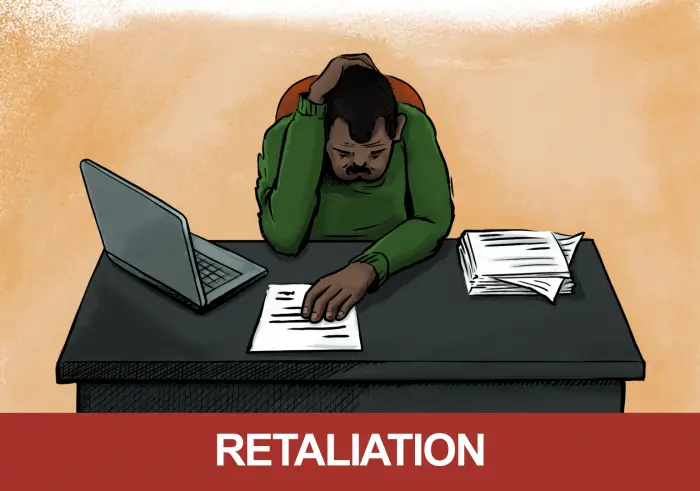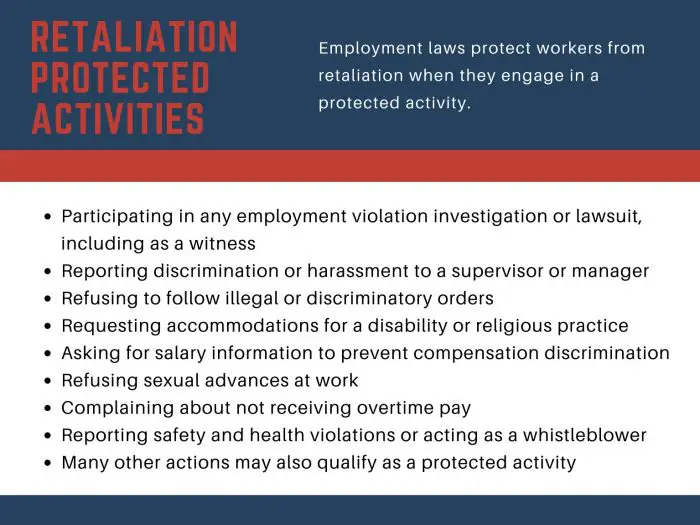What is Retaliation in the Workplace?
Your questions about workers’ rights, answered
Retaliation means harming someone for hurting you. And retaliation in the workplace means punishing an employee for holding their boss or company accountable.
You can lose a promotion, earn less pay, or even lose your job because of workplace retaliation. If you’ve experienced retaliation at work, you need to know what is retaliation in the workplace?
Keep reading to learn how to prove retaliation at work and what makes a strong retaliation case.
What is retaliation in the workplace?
Unfortunately, employers sometimes retaliate against employees. What does retaliation mean? Retaliation in the workplace means punishing an employee who reports workplace violations or engages in other protected activities.
That can mean firing someone for reporting their boss to HR. It can also cover illegally demoting a whistleblower or firing an employee for complaining about discrimination.
Employers cannot punish you for engaging in legally protected activities. Employment laws protect your rights if you face retaliation at work. However, only certain actions meet the legal definition of retaliation.
What is the legal definition of retaliation in the workplace?
The legal definition of retaliation covers punishing an employee for reporting an employment violation. Retaliation laws also ban employers from retaliatory firing or retaliatory discharge.
Overall, employers cannot fire employees for engaging in protected activities. What is a protected activity? Any action that protects an employee’s rights under employment laws.
For example, under employer retaliation laws, companies cannot punish employees for complaining about discrimination or harassment, filing a complaint about wage theft, or acting as a whistleblower.
Employers also cannot fire employees who testify against the company or participate in a workplace investigation.
What are signs of retaliation at work?
What does retaliation look like in the workplace?
Workers have a legal right to participate in certain protected activities. That includes filing complaints about discrimination or sexual harassment, acting as a witness in an investigation, or reporting violations of minimum wage or overtime laws.
Signs of retaliation include firing people who engage in protected activities, selectively denying raises, and giving poor performance reviews to employees with a record of positive reviews right after the employee engages in a protected activity.
What are some examples of retaliation?
Examples of workplace retaliation include firing someone for reporting their boss or for any other protected activity. Many laws, including discrimination laws and minimum wage laws, include retaliation provisions.
Retaliation in the workplace examples include:
- Firing an employee who complains about sexual harassment or wage discrimination.
- Refusing to promote an employee after they report their supervisor to HR.
- Giving a bad performance review to an employee with a strong track record after they complain to HR about workplace conditions.
- Cutting someone’s pay after they complain about unpaid overtime.
- Firing a whistleblower.
Other workplace retaliation examples include wrongful termination as a punishment for protected activities.
Can I sue my employer for retaliation?
If you’ve experienced retaliation, you need to know “Is retaliation in the workplace illegal?” And can you sue your employer for retaliation?
Here’s the good news: you can sue your employer for retaliation. A retaliation lawyer can help you determine whether your employer broke the law.
Your employer cannot punish you for engaging in a protected activity. That includes filing a complaint about discrimination, acting as a witness in an EEOC investigation, or acting as a whistleblower.
If you have been the victim of retaliation, you can file a lawsuit against your employer for lost wages and emotional distress.
During a workplace retaliation lawsuit, you will need to prove that your employer violated a workplace retaliation law. Contact an employment lawyer for a free consultation to learn whether you have a retaliation case.
Learn more by reading our guide to filing a retaliation lawsuit.
What is a retaliation lawsuit?
In a retaliation lawsuit, you can sue your employer for retaliating against you for protected activities.
This can include being fired after complaining about sexual harassment, receiving a pay cut after acting as a whistleblower, or being denied tenure for testifying in a discrimination investigation against your employer.
Workplace retaliation cases fall under employment law. Retaliation lawyers can help you prove retaliation and build a strong case.
How do you prove retaliation at work?
When you experience retaliation, you need to know how to prove retaliation in the workplace.
You can prove retaliation by documenting your actions and any retaliation by a supervisor. This can include being fired, being denied a promotion or demoted, or losing pay or benefits.
It’s also important to keep detailed records of your interactions with supervisors and HR.
If the retaliatory action came after a protected action, you may be able to prove that it violated the law.
For example, if a company fires an employee shortly after the employee complains about employment violations, acts as a whistleblower, or participates in an EEOC investigation, the employee can make a case that the firing qualifies as retaliation.
What makes a strong retaliation case?
If you experience retaliation at work, you need to know what makes a strong retaliation case. Clear evidence of retaliation can mean a larger settlement for victims.
A strong retaliation case includes a direct link between the protected activity and the retaliation. Consider this example: you ask your boss not to sexually harass you and he immediately fires you. Or you contact a supervisor about unpaid overtime and they immediately put you on suspension.
You’ll also need to show that you engaged in a protected activity. Records of emails, texts, or conversations about the protected activity will strengthen your case.
Hw much is a retaliation lawsuit worth?
Let’s say you file a retaliation lawsuit against your employer. How much is a retaliation lawsuit worth? And what is the average settlement for a retaliation lawsuit?
The answer depends on the specifics of your case. In 2024, the EEOC recovered nearly $700 million for victims of retaliation and discrimination. The EEOC reports that retaliation is the most common type of workplace discrimination. Retaliation makes up more than half of all EEOC claims.
In the districts around New York City, the average employment discrimination award for pain and suffering was $200,000, while the average award for punitive damages was $460,000, according to a study by Professor Vivian Berger. The settlement amount will vary depending on the facts of the case.
What is a legally protected activity?
Retaliation laws prevent employers from punishing you for engaging in “protected activities.” But what counts as a protected activity?
Legally protected activities include filing a complaint about harassment or discrimination, acting as a witness in an investigation, or answering questions during a company’s internal investigation.
Employees are also legally protected when they refuse to follow discriminatory orders, act as a whistleblower, or complain about wage theft. Employers cannot retaliate against employees for legally protected activities.
How to deal with retaliation at work
What does retaliation mean for your career? If you experience retaliation at work, you might worry about what it means for your job.
Documenting is the best way to deal with retaliation at work. Employees should keep records of interactions with their supervisors or HR that may prove retaliation, as well as records of their protected activities.
Employees can protect themselves from retaliation by documenting their protected activities and keeping records showing their performance reviews and conversations with their supervisor or HR about protected activities.
By knowing their rights, victims of retaliation can also recover lost wages, front pay, and damages by filing a retaliation lawsuit.
Contact a retaliation lawyer for a free consultation if you have been the victim of retaliation or another workplace rights violation.
What can you do about workplace retaliation?
Victims of workplace retaliation should contact an employment lawyer for a consultation. Some retaliation statutes require victims to file within a certain amount of time (as little as 30 days), so it’s important to reach out to a retaliation lawyer as soon as possible.
In New York, Charles Joseph offers free, confidential consultations to victims of retaliation. Charles Joseph brings over two decades of experience as an employment lawyer and founder of Joseph & Kirschenbaum, a firm that has recovered over $140 million for clients.
Learn more about retaliation protections, how to file a claim, and damages.


